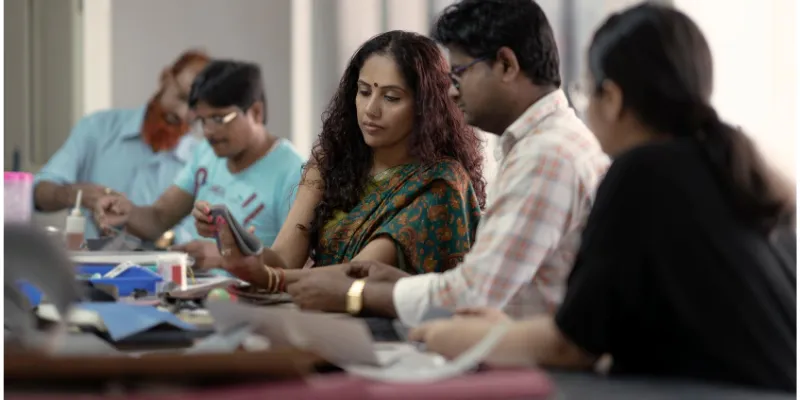This woman entrepreneur’s startup offers sustainable fashion accessories made from pineapple leaves and cactus
Mumbai-based Arundhati Kumar is the Founder of Beej, a vegan accessories brand that offers bags, wallets, and clutches made with sustainable material sourced from pineapple leaves, cactus leaves, cork, and other materials.

Arundhati Kumar - Founder of Beej
Sustainability is at the core of , a brand founded by Arundhati Kumar in the accessories space. The founder believes style and sustainability can and must co-exist, and it’s important to be conscious, mindful, and responsible even when no one is watching.
“Sustainability is not a single action or mere lip service for us at Beej, but a filter we apply to every decision,” says Arundhati as she introduces her brand that connects creativity, ethical practices, and mindful fashion seamlessly to make sustainable fashion mainstream.
Arundhati comes from a family of entrepreneurs, one of the oldest leather export houses of Kolkata. She completed her graduation from Lady Shriram College, Delhi, followed by an MBA from Fore School, Delhi.
Arundhati’s first entrepreneurial stint was in 2014 when she started a brand for customised accessories along with a colleague.
“My daughter was very young at that time and I realised I used to spend at least 20 days a month away from home, which wasn’t working for her. I decided to take a pause and went back to corporate life, joining Conde Nast India as their head of HR. As they say, once bitten by the entrepreneurial bug, it’s hard to let go. A few years later, I found myself wanting to start out on my own again,” she recalls.
The effects of climate change
She decided to quit and take a break for a few months before deciding what to do next. Around the same time she was holidaying in Europe and was caught in the middle of a torrid heat wave.
“That was the moment I realised that climate change is real and it's here already. For a few years I had been increasingly conscious and concerned about the climate crisis, and what was happening around us. It started with small lifestyle shifts. At home, we moved away from single use plastics, I started using drip irrigation to water my plants, became more conscious of my shopping habits and so on,” she says.
She came back with a clear plan and intent to work in the sustainability space. Accessories and bags had always been an area of interest, so Arundhati decided to merge the two.
During her research, the entrepreneur realised that while there were brands in India working with vegan leather, in most instances, this was faux leather made from PVC - not environmentally sustainable at all.
“That’s the gap I wanted to fill. Beej is India’s first premium sustainable accessories brand on a mission to make sustainability a mainstream fashion choice. I set up my studio in Mumbai because that’s where I live. Our products, including packaging, is designed and manufactured at our studio. We are currently retailing online on our own store as well as through multiple platform partners,” Arundhati says.
From nature’s lap

The products
Beej chooses Pinatex (made from pineapple leaves), cork, Desserto (cactus leather) — all plant based, recyclable, and partially or completely bio-degradable materials. Linings on the accessories are materials made from post-consumer recycled yarn while the zippers are recycled PET. The brand does not use any metal logos and instead embroiders/embosses logos to reduce use of hardware that can be difficult to recycle. All products are made to order as they look to minimise waste.
Beej launched on January 20, 2020, and did over Rs 2.5 lakh in sales in the first two months, Arundhati says.
“Unfortunately for us, just as we were gathering traction, the studio had to close in March because of the lockdown and we finally reopened in mid-June. Since then although revenues are still muted, we have seen a steady increase of visitors on our website and followers on our Instagram handle. Through the lockdown, we also worked on increasing our distribution presence and are now retailing on two of India’s largest luxury fashion portals (Nykaa Boutique and Tata Indi-luxe) along with some smaller niche platforms that curate sustainable/independent labels like Brown Living,” she says.
“At the moment Beej’s focus is two-pronged: building a distribution network both within India and globally, and working on our product offerings. While in lockdown, the team developed a range made from Khesh, an upcycled handloom material from eastern India, which we will launch on our website very soon along with the global materials we work with,” she adds.
Beej is currently bootstrapped, with the founder investing Rs 30 lakh from her savings for studio space, machinery, material inventory, etc. It is also incubated by the NMIMS AIC as a part of the Niti Aayog programme.
Greater focus on sustainability

Arundhati with her team
The sustainable accessories startup works on a multi-channel revenue model, retailing through its online store and ecommerce partners. Another channel for revenue is private labelling, in India and internationally.
The brand is currently in conversations with a couple of leading Indian designers to create a sustainable accessories collection for them, and also a couple of niche sustainable only platforms through which it will retail in the US and Europe markets.
Arundhati believes the fashion industry in India and globally is going through a major crisis and an overhaul of sorts. In times to come, she says, we will see a greater focus on sustainability, call for transparent supply chains, increased impetus on local artisan craft, and hopefully a reduction in slow fashion consumption.
“One of my key learnings as an entrepreneur has been not to take anything personally. Early on, I would get really upset if I reached out to someone who didn’t respond or then refused to associate with us. I have seen multiple instances where the same people come back a few months later, wanting to associate because now you have grown a little bigger,” Arundhati says.
Edited by Teja Lele









